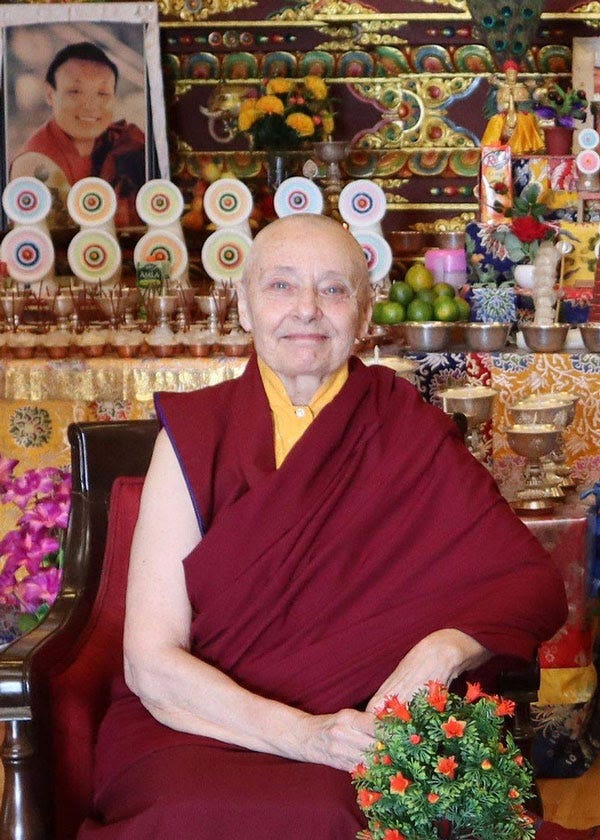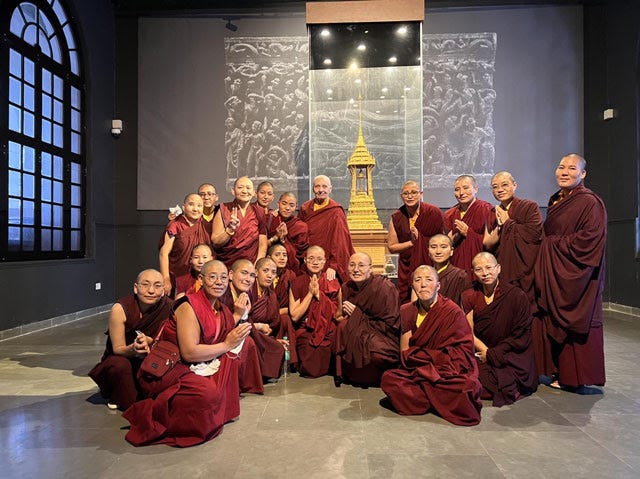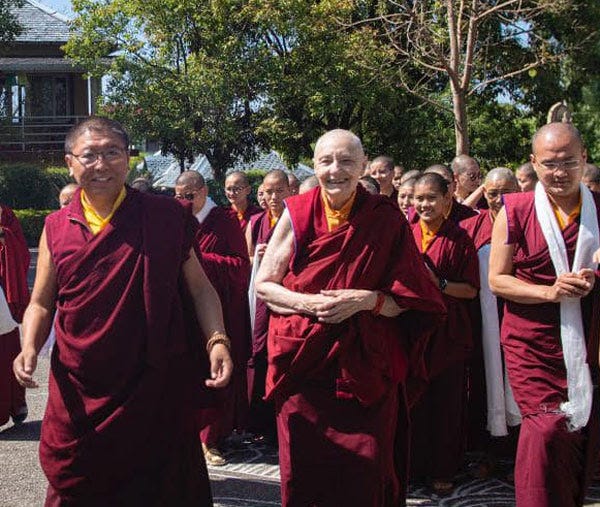
Can we tell how far we have travelled on the path to enlightenment? Is there some kind of measure or litmus test? Over the years I’ve encountered one particular indicator that’s especially intriguing.
It is not which of the nine levels of meditative concentration we have reached – although realisations on the cushion give rise to it. Nor is it about how much we focus on helping others – even if, once again, this behaviour is correlated.
The yardstick is simply this: how ‘right’ do we need to be? Specifically, if someone expresses views different from our own, how much do we feel the need to correct them? How important is it that other people accept our world view? Or respect the values that we cherish?
These are difficult questions, but they go to the heart of Buddha’s teachings about the nature of reality, and the extent to which we have internalised those teachings.
“Righteous indignation” in a degenerate world
Many of us find it hard to avoid the feeling that we live in an increasingly polarised and decadent world. The number of topics that provoke heated argument seems to multiply with each passing year - climate change, identity issues, what we eat, the Covid response. As it happens, the idea of living in degenerate times is as old as mankind, as revealed in a fascinating new study just published in Nature magazine on the illusion of moral decline.
Of less doubt is the perverse influence of social media in provoking our worst selves. As we witnessed with the recent Dalai Lama video scam, it’s devastatingly easy for people to be manipulated into believing the very opposite of what is true, and to then give voice to angry accusations – actions which, unfortunately, are the cause for the accusers to have significant karmic obstacles to see holy beings in the future.
Fuelled by the dynamics of the digital world, “righteous indignation” and “principled anger” are not just tolerated but encouraged. Without even realising it, we can get caught up in a way of thinking which is not only unpleasant to experience as it’s happening, but which is also massively self-destructive from a karmic perspective.
A deva, a preta and a human walk into a bar …
Here, a well-known metaphor from Tibetan Buddhism can help get us back on track. The example tells of how a deva, a human and a preta are offered a glass of something that’s wet and flowing. Devas or pleasure beings are said to have lives of continuous gratification, while pretas or hungry ghosts experience the opposite, never satiating their hunger or thirst. For the sake of this analogy, it doesn’t matter whether we think of devas and pretas as metaphorical or real.
What matters is how the three different types of being perceive what’s put in front of them. The deva sees a glass of ambrosial nectar. The human, a glass of water. The hungry ghost, a glass filled with pus and blood.
Which of them is right, is the question lamas ask?
To cut to the chase, all three of them are correct. They are all valid cognisors forced to see what they do because of their karma. Something that all three can agree is “wet and flowing” may be set before them, but the qualities and characteristics of that object, far from being self-established, arises from their karma. Which is why we may describe the thing as a projection. We’re not saying that there’s no basis onto which something is being projected. Only that the way it appears depends on an individual’s karma.
Let’s take this teaching and apply it to conventional reality. “Transgender people should X, Y and Z!” we may hear someone say. “Covid vaccines are A, B and C!”
We think the opposite. Not just think. Every fibre of our being knows the opposite to be true. We have science and facts on our side. Just like the deva knows that the glass contains the most delightful offering of ambrosial nectar. She’s already taken a sip! But down the counter from us, the being making the inflammatory claims is a preta. And the preta is equally adamant.
The point is that other people’s cognition may be just as valid to them as ours is to us. They may be just as right as we are. The difference is karma. It’s a waste of breath for a preta to try to persuade a human that they are about to drink a mouthful of pus when they can clearly see water. Why are you being so negative?!
Letting go
So, Buddhist mind-training tells us, let go. Unless a person is actively canvassing different perspectives, or open to an alternative viewpoint, we’re better off saving our breath. How far should we go in defending our own opinions? To quote the great teacher Shantideva who, incidentally, was horribly maligned by his peers for a long time at Nalanda Monastery:
When others, out of jealousy
Treat me wrongly with abuse, slander, and scorn,
May I take upon myself the defeat
And offer to others the victory.
Several months ago I went to a stimulating presentation by Timber Hawkeye, author of Buddhist Boot Camp. He held up an outsize version of a wooden tongue depressor/ice lolly stick on which was written two phrases. The phrase facing the audience said: “Tell me more.” The phrase facing himself was: “This has nothing to do with me.”
This is how we interact with people whose views are different from ours, he said. By all means let them speak. If it helps them, encourage them to share their opinions – tell me more! But don’t think that what they say has anything to do with us. It is their views, their perceptions. The fact that they see pus and blood where we see water doesn’t make them wrong. It’s their karma and there’s not a whole lot that we can do about it.
We don’t have to be right. To persuade others to respect or value what we do. Calling on common sense, morality, the law, science or any of our other usual go-to-s serves little purpose. There’s no point getting upset that they just don’t get it. This, really, is the important part: our becoming angry on account of others’ ‘misperceptions’ doesn’t in any way affect them. Not one bit. But it affects us. Every angry moment we spend demonising those we disagree with creates the karmic seed for us to see demons in the future. Nothing positive can result from a negative cause. To repeat the oft-used analogy, getting angry is like drinking poison and expecting the other person to get sick.
The importance of button removal
It’s crazy to think how much negative karma we create for ourselves on account of politicians and other leaders whose views we find toxic. People we haven’t met and probably never will. Every brick we throw at the screen, literal or figurative, doesn’t just add another cause for unhappiness into our negative karma silo. It is unpleasant to experience in the here and now. Not to mention unpleasant for the people we live with. Anger and contentment can’t co-exist. If unwavering equanimity is what we’re aiming for, there is no place for outrage, principled or otherwise.
A friend of mine once asked his lama, “How can I stop so-and-so pressing my buttons?” To which the lama replied, “Take your buttons away.” It’s a simple response. Perhaps it even sounds a little glib. But ‘simple’ doesn’t in any way mean ‘easy’. Button removal demands patient perseverance. And we all have plenty of buttons to remove! The process may be somewhat easier when we understand the concept of the three beings and an acknowledgement that the reality we inhabit is our own creation, one which is not necessarily shared by others.
The caveat
None of this is in any way to suggest that we should let people take advantage of our good nature, abandon our principles, or be railroaded into doing something that we know isn’t helpful. Statesman and philosopher Edmund Burke is famous for saying that “The only thing necessary for the triumph of evil is for good men to do nothing.”
The Dharma does not say we should do nothing or that we should not advocate on behalf of those who need help. And there are no more practiced debaters than Tibetan Buddhist monks who know better than most of us exactly how to marshall incisive arguments. All the Tibetan Geshes I have ever encountered are powerful individuals - the last people on earth who would ever cave in.
What is being said, rather, is that first and foremost we are to manage our own state of mind. In particular, not allow ourselves to become upset about what other people say or do. Indignation, outrage or anger are unlikely states from which to act with clarity and wisdom. Compassion is a much safer energy source than anger. Much better that we remain calm so that when we do make our voice heard, or take whatever actions we deem important, we act from a place of wisdom using skilful means.
If we are truly convinced that a particular person or group is doing evil, far from being furious, the wisdom-based approach is one of compassion: that person or group is creating the causes to experience untold suffering for lifetimes, maybe aeons to come.
A Tibetan monk, Lopon-la, was imprisoned by the Chinese and tortured for years before he managed to escape to India. When asked by the Dalai Lama if he had felt fear in jail he said he had been most afraid of losing his compassion for the Chinese. What an extraordinary embodiment of mind-training! And exactly why those feisty Tibetan Geshes focus more on subduing inner goes rather than perceived outer ones.
As we mature, we may even find it’s possible to like, and even love people whose views on certain subjects are the polar opposite of our own. Why not? We may have the shared karma to perceive Mozart as glorious and homeless dogs as in urgent need of support – so let’s focus on those rather than the subjects that divide us.
In summary
We don’t need to prove that we’re right, so let’s just relax. Cultivate the habit of equanimity. When people say things that trouble us, do as my precious lama Geshe Acharya Thubten Loden used to, which is to shrug and say, “Like yapping dogs. Disregard.” Let’s strive to become expert button-removers, free of egoic attachment. Hard though it may be, instead of arguing, in Shantideva’s words, lets offer to others the victory.
Even though we know it really is a glass of water!
One of the four charities that benefits from your subscription to this newsletter is Dongyu Gyatsal Ling (DGL) nunnery, established by the extraordinary Jetsunma Tenzin Palmo (above).
Jetsunma turned 80 this week. What a milestone! We’d live to wish her good health, long life and may her enlightened activites continue and flourish!
This week I received an update written by Jetsunma to mark this special occasion. As a DGL sponsor, I’d like to share it with you below.
In case you missed it, thanks to the generosity or our little Substack group, a few months ago I was able to donate enough money to sponsor 10 nuns for a year.
From Jetsunmna Tenzin Palmo:
Founding the Nunnery and the Buddhadharma
How fast time passes! It has now been 24 years since Dongyu Gatsal Ling was first started at Tashi Jong back in 1999. We are very happy that now the nunnery is fully flourishing with 118 nuns from the various Himalayan regions living in harmony while studying and practicing the Dharma with both sincerity and cheerfulness.
The Buddhadharma shows us how to make this life meaningful by transforming our habitual responses of greed or irritation into positive factors that open the heart and encourage insight. Not just to ‘be kind’ but the techniques that can help us to become so. However, all the teaching in the world cannot change us if we do not put the advice into practice — throughout the day under all circumstances. The teachings on Mind Training (Lojong) are especially helpful and practical in these challenging times. The message is always contemporary and immediately useful for transforming our daily life into our Dharma practice.
DGL Nunnery news
In April, I was invited to speak at the Global Buddhist Summit in Delhi, which was honored by the presence of HH Dalai Lama and Prime Minister Narendra Modi. Twenty DGL nuns were also invited and enjoyed seeing Delhi for the first time in most cases.
Recently two of our DGL nuns, Lhachö Wangmo and Tsewang Chodron, were selected as the Kagyupa representatives by the Tibetan Ministry of Religion & Culture in Dharamsala to do a 4-year research program (rather like a PhD thesis) on some aspect of philosophy — Madhyamaka, Prajnaparamita, etc. Our Khenpo Sonam Wangyal was chosen as part of the Nyingmapa team (as the Kagyu slot was already filled by our nuns).
Recent visitors to DGL have included Tsoknyi Rinpoche in April who gave an enlivening and enlightening talk to the nuns — with lots of laughter — and also spent time with the retreat nuns. Then Penpa Tsering, the president of the Tibet government-in-exile, visited and was very charming to the nuns.
Our Khenpo and all the Genlas (nun teachers) went to Lahaul on pilgrimage recently and Kalden took them up to the cave and to Tayul and Peukar Gonpas. Meanwhile the nuns are absorbed in their revision and end-of-term exams.
May all beings be well and happy.
Tenzin Palmo
About half the money you help me raise through your subscription goes to the following four charities. Feel free to click on the underlined links to read more about them:
Wild is Life - home to endangered wildlife and the Zimbabwe Elephant Nursery; Twala Trust Animal Sanctuary - supporting indigenous animals as well as pets in extremely disadvantaged communities; Dongyu Gyatsal Ling Nunnery - supporting Buddhist nuns from the Himalaya regions; Gaden Relief - supporting Buddhist communities in Mongolia, Tibet, Nepal and India.
If you’re fairly new to my Substack page and would like to explore further, you can read my previous posts under the Archive button here.






I saw this email in my inbox this morning and knew I had to read it immediately. I have spent the last few days immersed in helping to rally neighbors & prepare a statement in opposition to a building contractor’s request to change certain restrictions. These restrictions are currently in place and they protect my neighborhood and wildlife from proposed changes that I perceive as harmful. After reading this I was struck by two things, the truth of your words and the fact that I never felt anger or resentment towards the people who submitted these variance requests to the city for approval. I approached this with the intention of doing the best I could and understanding they have their point of view as I have mine. I feel pain and sadness for the wildlife primarily as they are always the innocent victims of the rapid devastating change we humans too often inflict upon them. If the contractors achieve getting the current restrictions overturned I will refocus on relaying to our wildlife the urgency of moving their families to safer ground.
Again my thanks for posting an article that is deeply meaningful to me.
As almost always, new~always these dharma messages arrive at preciously the most auspicious moment when the lesson offered is just the perfect lesson needed in the moment. AHHH!!! Much gratitude for the divine timing! And blessings to you, David, for your thoughts/words/deeds and for the beings who support the dharma way. May we all feel the peace that surpasses understanding. I have been a student of the Sufi path for over half my life and recently immersing myself in the words and practices offered by the historical Buddha...may all beings be happy, may all beings be well...Om shanti Om Shanti Om shanti Om...Blessings, Mirabai